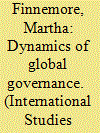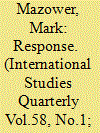|
|
|
Sort Order |
|
|
|
Items / Page
|
|
|
|
|
|
|
| Srl | Item |
| 1 |
ID:
118585


|
|
|
|
|
| Publication |
2012.
|
| Summary/Abstract |
The structure of cooperation between Brazil, Russia, India, China, and South Africa, known as the BRICS format, has in recent times become a remarkable phenomenon in world politics. The answer to the question of BRIC's prospects depends largely on the policies of China, objectively the quintet's economic leader and growing in political influence as well on a global scale. In this work, we present an analysis of PRC aims and interests in the BRICS format. They are examined in the context of China's current and forecast place in the world, the main features of PRC domestic development, and the main motifs, directions, and forms of its international strategy.
|
|
|
|
|
|
|
|
|
|
|
|
|
|
|
|
| 2 |
ID:
131014


|
|
|
|
|
| Publication |
2014.
|
| Summary/Abstract |
It is hard to quarrel with Weiss and Wilkinson's argument that deeper investigation of global governance could have big payoffs, and the four "primary pursuits" or research tasks they sketch will interest many scholars in this field. My concern is that while Weiss and Wilkinson nicely describe the importance of these tasks, they offer only cursory suggestions about ways forward when they could do much more. Unlike Weiss and Wilkinson (hereafter W&W), I see a great deal of first rate work being done that speaks directly to issues they raise-how power is exercised globally,2 structures of global authority,3 increasing complexity,4 actor proliferation, and change. The problem, I would argue, is not that scholars are ignoring these issues, but that so much more could and should be done. In this short essay, I build on foundations laid by others to sketch more focused research agendas for global governance scholars in four areas to tackle some of the central questions W&W identify, with particular attention to their laudable interest in change.
|
|
|
|
|
|
|
|
|
|
|
|
|
|
|
|
| 3 |
ID:
131013


|
|
|
|
|
| Publication |
2014.
|
| Summary/Abstract |
Weiss and Wilkinson ask us to figure out how to give greater precision to the concept of "global governance" in order better to understand how the world is run and perhaps also to have greater hope of changing it in the way we would like. This approach assumes that the concept is worth sticking with. I find myself unsure of this.
On the one hand, as they point out, international affairs did acquire a greater degree of functional complexity toward the end of the twentieth century as a variety of nonstate actors took on global roles and states themselves became umbrella rubrics for ever proliferating agencies and ministries with international competences. There is no question that Realism in particular was poorly equipped to understand this 'new world order'.
|
|
|
|
|
|
|
|
|
|
|
|
|
|
|
|
| 4 |
ID:
179477


|
|
|
|
|
| Summary/Abstract |
All great powers have a deeply ingrained self-perception shapedbyhistorical experience,
geography, culture, beliefs, and myths. ManyChinese today yearn to recover
the greatness ofa time when they ruled unchallenged at the pinnacle oftheir
civilization, before “the century ofhumiliation.”
|
|
|
|
|
|
|
|
|
|
|
|
|
|
|
|
|
|
|
|
|